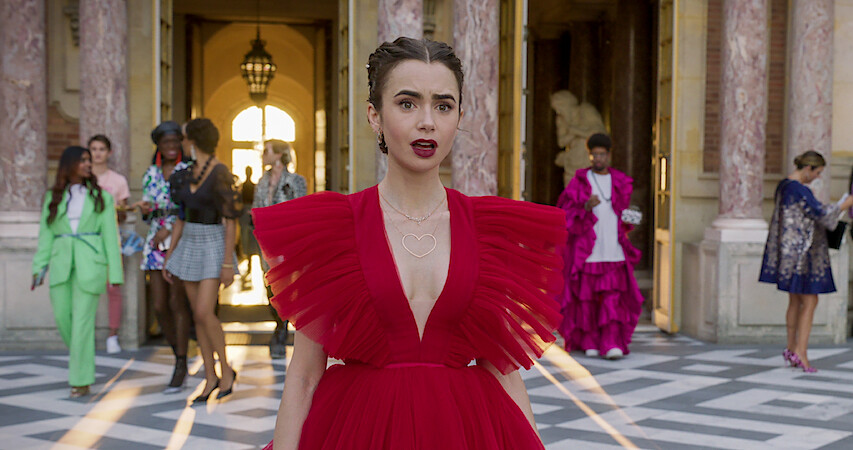
The latest season of Netflix’s beloved series Emily in Paris introduces a surprising narrative about sexual misconduct in the fashion industry. How does the show approach this serious topic, and does it offer a realistic portrayal?
Created by Darren Star, Emily in Paris shares several similarities with Star’s earlier hit show, Sex and the City. From its quirky protagonist to its love for Parisian glamour and fashion—thanks in part to Patricia Field, who also designed costumes for Sex and the City—the new series mirrors many of its predecessor’s themes. This season, however, Emily in Paris tackles a new issue: sexual harassment in the fashion world.
In the 2002 Sex and the City episode, Carrie Bradshaw encounters sexual harassment at Vogue’s fashion closet. While searching for the elusive “urban shoe myth”—the Manolo Blahnik Mary Janes—Carrie unexpectedly finds her mentor, Julian, in a compromising situation. Despite her discomfort, Carrie navigates the situation by trying to maintain her position at Vogue while fending off inappropriate advances. This episode aired long before the #MeToo movement gained prominence, but now, Emily in Paris follows a similar path with its own take on harassment.
The show’s fourth season, which premiered recently, includes a plotline addressing sexual harassment in the fashion industry. While documentaries such as Scouting for Girls, Victoria’s Secret: Angels & Demons, and White Hot: The Rise & Fall of Abercrombie & Fitch have highlighted allegations of misconduct, mainstream fictional representations have been scarce.
For those unfamiliar with Emily in Paris, the series follows Emily Cooper (played by Lily Collins), who moves from Chicago to Paris to work at the French marketing firm Savoir after her boss discovers she is pregnant. Emily, who does not speak French and has a distinctly American work ethic, initially clashes with her French colleagues, including the sophisticated Sylvie (Philippine Leroy-Beaulieu) and her team members Julien (Samuel Arnold) and Luc (Bruno Gouery). Emily also finds herself entangled in a love triangle with her neighbor Gabriel (Lucas Bravo) and his ex, Camille (Camille Razat). However, Emily’s friendship with aspiring singer Mindy (Ashley Park) provides some support.
In the new season, a scene reminiscent of Carrie’s Vogue experience unfolds when Mindy is thrilled to browse the workplace wardrobe of luxury brand JVMA, owned by her fiancé Nicolas de Léon’s father, Louis de Léon. When two female employees discover Mindy trying on various outfits, they tell her she needs a “buddy,” which Mindy initially misunderstands. Later, Mindy learns that this “buddy system” was created because Louis de Léon insists that employees try on clothes in front of him to prove their dedication. Failure to comply means being labeled a fashion philistine and facing stagnation in their careers.
This plotline echoes earlier references in the series to Sylvie’s past experiences with Louis, hinting at an inappropriate incident between them. As Savoir considers a partnership with Louis, Emily expresses her concerns to Sylvie, who initially dismisses the issue by citing the past. However, upon discovering that Louis continues to harass employees, Sylvie decides to take action. This development highlights a perceived generational divide in attitudes towards speaking out against abuse, a concept that has faced skepticism and varying levels of acceptance in France compared to other Western nations.
French attitudes toward sexual harassment and the #MeToo movement have been slower to evolve. According to fashion expert Marian Kwei, French cultural norms surrounding sex have hindered the movement’s progress within the fashion industry. While some French high-profile figures have faced allegations—such as photographer Patrick Demarchelier, model agent Jean-Luc Brunel, and others—results and reactions have varied. French feminism’s unique perspective on sex and men has contributed to a slower #MeToo movement in France, reflected in mixed outcomes of allegations and a higher dismissal rate of rape accusations.
In the film industry, the #MeToo movement has similarly faced resistance, with some prominent French artists expressing skepticism. Nonetheless, there are notable efforts within French cinema to address these issues, such as Noémie Merlant’s film The Balconettes and Maïmouna Doucouré’s Cuties, although the latter faced controversy due to Netflix’s marketing.
While Emily in Paris remains a lighthearted take on the fashion industry, its portrayal of sexual harassment offers a glimpse into a serious issue. The show’s decision to have Sylvie expose Louis de Léon’s misconduct could serve as a hopeful signal for real-life change in the industry.





